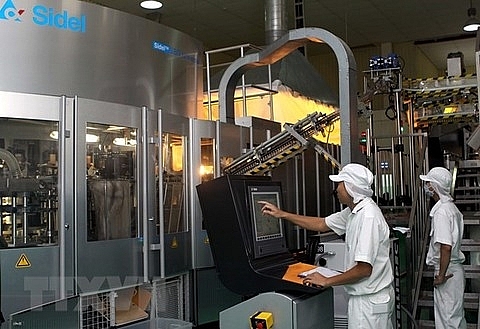Economic growth reduces dependence on bank loans
 |
| Credit flowed mainly to manufacturing sectors to contribute to GDP growth. - VNA/VNS Photo |
A few years ago, Vietnam’s economic growth was mainly based on capital and labour due to modest total factor productivity (TFP). This meant that the nation’s high GDP growth required high investment, and loans had a domino effect on the country’s growth.
There was time when credit growth was even used to estimate the country’s economic growth. For example, bank loans often increased by 1.5 times or two times over GDP growth.
However, dependence has reduced significantly recently and credit is no longer the decisive factor for the country’s economic growth.
According to the National Financial Supervisory Commission, GDP in the first half of 2018 grew at 7.08 per cent against the same period last year, the highest rate in eight years, while credit growth in the period expanded only about 6.5 per cent, much lower than the same period last year of 8.7 per cent.
The same trend was also seen last year when credit grew at only 18.17 per cent, lower than the increase of 18.71 per cent in 2016, while GDP growth was 6.81 per cent, higher than the growth of the years from 2011 to 2016.
Experts attributed the positive change to the improvement of credit quality.
According to the State Bank of Vietnam (SBV), credit structure in the first six months of 2018 focused mainly on manufacturing (up 7.7 per cent), agriculture (up 7.2 per cent), small- and medium-sized enterprises (up over 3 per cent).
Meanwhile, credit for risky areas such as securities and real estate industries was small. Credit flowed mainly to manufacturing sectors to contribute to GDP growth rather than focusing on speculative sectors like real estate or stock markets as years ago.
Besides, the dependence of GDP growth on credit has been declining due to the contribution of the FDI sector to the economy.
In the first six months of 2018, the industrial sector was the best performer with an increase of 9.28 per cent, of which processing and manufacturing had a growth rate of up to 13.02 per cent, the highest rate in seven years. Meanwhile, most FDI firms didn’t borrow or borrow overseas loans, hence, though production and business grew, the country’s credit growth was not directly affected.
What the stars mean:
★ Poor ★ ★ Promising ★★★ Good ★★★★ Very good ★★★★★ Exceptional
 Tag:
Tag:
Related Contents
Latest News
More News
- Cashless payments hit 28 times GDP in 2025 (February 04, 2026 | 18:09)
- SSIAM and DBJ launch Japan Vietnam Capital Fund (February 04, 2026 | 15:57)
- Banks target stronger profits, credit growth in 2026 (February 04, 2026 | 15:43)
- Vietnam on path to investment-grade rating (February 03, 2026 | 13:07)
- Consumer finance sector posts sharp profit growth (February 03, 2026 | 13:05)
- Insurance market building the next chapter of protection (February 02, 2026 | 11:16)
- NAB Innovation Centre underscores Vietnam’s appeal for tech investment (January 30, 2026 | 11:16)
- Vietnam strengthens public debt management with World Bank and IMF (January 30, 2026 | 11:00)
- Corporate bond market poised for stronger growth cycle (January 28, 2026 | 17:13)
- Vietnam's IPO market on recovery trajectory (January 28, 2026 | 17:04)






















 Mobile Version
Mobile Version